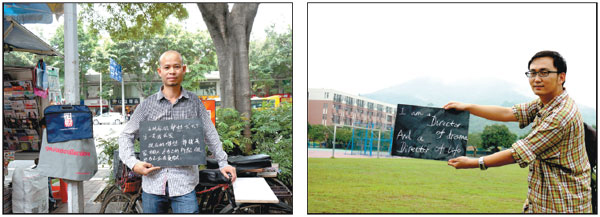 |
|
Two of the 15 people Huie photograhed in Guangzhou, who wrote about their dreams on a small chalkboard.
|
Photographer Huie says that he has achieved his dream of becoming an artist, a dream driven by his identity crisis, "the feeling of belonging and not belonging".
"In America, I am not Chinese but I am also not really an American," he says.
He recalls being the only Asian face at his school until another Asian kid showed up when he was an 11th-grader. Huie avoided him.
"I didn't realize that I was avoiding someone just because I thought he looked like me," Huie says. "I felt that I was like everyone around me and I forgot what I looked like."
New friends often asked Huie whether he knew any kung fu, whether he was good at math or whether he was a nerd.
"You don't grow up with a mirror in front of you," Huie says. "People around you are your mirror. More importantly, popular culture is your mirror.
"It took me long time to realize how distorted that mirror is."
In an attempt to understand his identity, Huie and his ex-wife embarked on a nine-month trip throughout the US in 2001. They took more than 7,000 photos of Asian residents, recording the triumphs and setbacks they faced in pursuit of the American dream.
Huie came to China in 2010 with an exhibition of 60 such documentary photos, which toured a dozen cities over two years. He also gave lectures at various universities, museums and art schools, sharing his insights about life in the US.
Now, Huie is turning a spotlight on Chinese people in their home country and hopes to show the US audience the realities of life in China.
He will exhibit the photos he took in Guangdong in his gallery in Minneapolis at a show opening June 21, as part of a project called "Chinese-ness".
Li Rongjian, Huie's distant relative in Guangzhou who owns a restaurant, helped to arrange the photographer's trip to Guangdong, booking accommodation, finding an interpreter and renting a car for his visit to Taishan.
"I appreciate his idea of showing the real China to foreigners with his photos. But I hope that he won't photograph only the poor people and migrant workers," Li says.
"China is growing fast to be more and more powerful, and people's lives here are getting better and better. I think Huie should show this good side to Americans, too."
Huie responds that his is a long-term project, and he will come back to China to visit more cities and photograph more segments of the society.
"Everyone has biases and stereotypes," Huie says. "Having direct conversations with people you don't know is the way to be aware of your biases and stereotypes and close the gap between perception and reality.
"That's what my projects want to tell the audience."
We Recommend:
